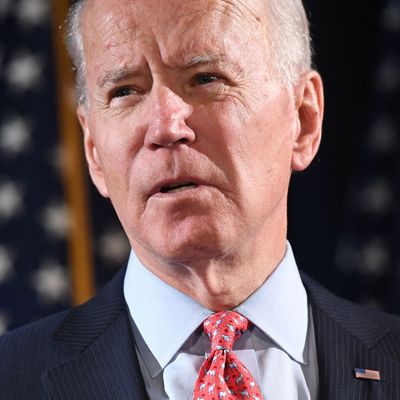
One of the interesting things about the George Floyd protests and their consequences is that Democratic politicians do not appear tempted to follow Republicans into a law-and-order reaction to the unrest. That is conspicuously true of the putative 2020 presidential nominee of the party, Joe Biden. His stance is particularly significant since Biden is closely associated with atavistic crime policies, thanks to his principal sponsorship of the now-notorious 1994 omnibus crime bill (an association that Donald Trump, the “law and order president” himself, constantly mentions as buttressing his comparative case for black voters’ support).
In a speech last week, Biden was not at all ambivalent about the righteousness of the protests against police misconduct, calling Floyd’s murder a “wake-up call” from “communities that have had a knee on their neck for a long time.”
But in a statement today, his campaign drew a line between Biden’s position and calls to “defund the police” (a popular slogan among Black Lives Matter activists) as Axios reports:
“As his criminal justice proposal made clear months ago, Vice President Biden does not believe that police should be defunded,” Biden campaign spokesperson Andrew Bates said in a statement. “He hears and shares the deep grief and frustration of those calling out for change, and is driven to ensure that justice is done and that we put a stop to this terrible pain.”
Biden is instead embracing the far more conventional idea of “police reform.”
“Biden supports the urgent need for reform … so that officers can focus on the job of policing,” Bates said.
“This also means funding community policing programs that improve relationships between officers and residents, and provides the training that is needed to avert tragic, unjustifiable deaths.”
“There are many police departments across the country who are seeking to realize these kinds of changes, but haven’t had the resources to — and the Trump Administration has in fact made obtaining those resources more difficult. This is at the core of Joe Biden’s plan to bring transformative change to our criminal justice system.”
“Defund the police” can mean as many different things as “police reform,” but few, if any, of those chanting the slogan are hoping for new “resources” being made available to police departments. What’s interesting about Biden’s current proposals on policing is that they can be traced back to one element of the 1994 crime bill that he has not repudiated or apologized for: an initiative to hire 100,000 more police officers and deploy them to buttress “community policing” strategies designed to improve relations between law-enforcement personnel and (particularly minority) citizens.
In his campaign’s “Justice” policy paper, Biden complains that the “100,000 cops” initiative (formally known as COPS, for Community Oriented Policing Services), which became a Clinton administration signature program, was never fully funded:
[T]he program has never been funded to fulfill the original vision for community policing. Biden will reinvigorate the COPS program with a $300 million investment. As a condition of the grant, hiring of police officers must mirror the racial diversity of the community they serve. Additionally, as president, Biden will establish a panel to scrutinize what equipment is used by law enforcement in our communities.
It’s a reminder that back in the ’90s, most liberals viewed “community policing” and increasing the number of cops on the beat as an alternative to conservative lock-’em-up approaches, not as a get-tough, law-and-order measures. Indeed, conservatives at the time often mocked community policing as a bleeding-heart attempt to essentially turn cops into social workers.
As recently as last year, left-of-center writer Matt Yglesias, writing at Vox, touted the idea of hiring more police as good policy, and noted that it had majority support among African-Americans and Latinos as well as white voters, despite the focus on police misconduct the Black Lives Matter movement had helped galvanize:
[T]here’s a very real risk that in the wake of the leftward swing in the Black Lives Matter era, Democrats are leaving behind genuinely effective and politically appealing approaches to criminal justice that the party has championed in the recent past.
Biden pretty clearly isn’t leaving “more cops, better deployed” behind. But the question now is whether post–George Floyd the ground has moved enough that Biden could be left behind by some of the African-American voters he really needs in November — particularly the younger African-American voters who don’t share their parents’ and grandparents’ enthusiasm for Uncle Joe. Is “police reform” enough for them? How about if “police reform” involved providing more funding for even more police officers? These could be important crime-policy questions for the Democratic Party, and for Biden’s chances of being elected to take charge of the country’s justice system.






























